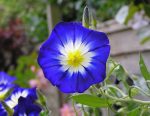 Native to southern Europe and North Africa, this annual or tender perennial is a member of the morning glory family, Convolvulaceae, that also includes sweet potato, water spinach, and dodder. The low growing bushy plants are branched and form slightly trailing mounds 1-2′ tall rather than climb. The mid-green leaves are lance-shaped, sessile, and up to one inch long. The 1.5-2″ wide funnel-shaped flowers appear in the axils of the leaves and open for one whole day, unlike those of their twining cousins, Ipomoea tricolor, that close in the afternoon. The petals are usually light to dark blue and have white at the base and yellow in center, but cultivars are available that vary in color. Flowering occurs in the summer over a long bloom time and plants are heat and drought tolerant once established. A good choice for use in containers, rock gardens and borders or as a groundcover or edger. The genus name, Convolvulus, comes from the Latin word convolvere meaning to twine around and refers to the twining nature of most of the plants in the genus (but not this plant). The specific epithet, tricolor comes from the Latin words tres meaning three, and color meaning color and refers to the petals that feature three different colors.
Native to southern Europe and North Africa, this annual or tender perennial is a member of the morning glory family, Convolvulaceae, that also includes sweet potato, water spinach, and dodder. The low growing bushy plants are branched and form slightly trailing mounds 1-2′ tall rather than climb. The mid-green leaves are lance-shaped, sessile, and up to one inch long. The 1.5-2″ wide funnel-shaped flowers appear in the axils of the leaves and open for one whole day, unlike those of their twining cousins, Ipomoea tricolor, that close in the afternoon. The petals are usually light to dark blue and have white at the base and yellow in center, but cultivars are available that vary in color. Flowering occurs in the summer over a long bloom time and plants are heat and drought tolerant once established. A good choice for use in containers, rock gardens and borders or as a groundcover or edger. The genus name, Convolvulus, comes from the Latin word convolvere meaning to twine around and refers to the twining nature of most of the plants in the genus (but not this plant). The specific epithet, tricolor comes from the Latin words tres meaning three, and color meaning color and refers to the petals that feature three different colors.
Type: Annual or tender perennial
Bloom: Funnel-shaped with blue, white, and yellow petals, all summer
Size: 1-2′ H x 2′ W
Light: Full sun with some afternoon shade in hot climates
Soil: Average, medium moist, well-drained
Hardiness: Zones 9-11 but usually grown as an annual elsewhere
Care: Low maintenance
Pests and Diseases: Generally pest free but susceptible to aphids and spider mites
Propagation: Plant seeds in fall in warm climates; elsewhere plant when soil has warmed up in spring. Nick the seeds and soak in water over night before planting.
Companion Plants: Celosia, marigold, melepodium
Outstanding Selections:
‘Blue Ensign’ ((bright blue on petals)
‘Cambridge Blue’ (pale blue on petals)
‘Red Ensign’ (dark red on petals)
‘Rose Ensign’ (rosy red on petals)
Royal Ensign(intense dark blue on petals)
Photo Credit: Wikipedia